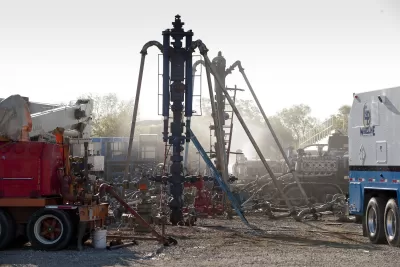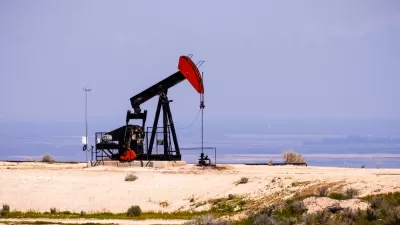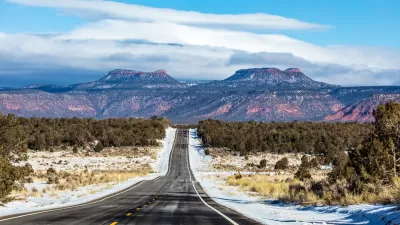Opponents of federal oversight rejoice: a ruling by U.S. District Judge Scott Skavdahl reiterates the limitations of the federal government to regulate fracking.

"A federal judge in Wyoming has struck down the Obama administration's regulations on hydraulic fracturing," reports Camila Domonoske, "ruling that the U.S. Bureau of Land Management doesn't have the authority to establish rules over fracking on federal and Indian lands."
According to Domonoske, "Skavdahl made it clear what he was — and wasn't — considering in his ruling." Here's the judge's own words, taken directly from the ruling [pdf]:
The issue before this Court is not whether hydraulic fracturing is good or bad for the environment or the citizens of the United States....The Constitutional role of this Court is to interpret the applicable statutory enactments and determine whether Congress has delegated to the Department of Interior legal authority to regulate hydraulic fracturing. It has not.
The Department of the Interior issued the regulations in March 2015, requiring "that companies drilling for oil and natural gas disclose the chemicals they use in the fracking process," among other measures, explains Domonoske.
Domonoske also explains that this week's court ruling came down to regulatory powers (or lack thereof) established by the Energy Policy Act of 2005. "As Skavdahl notes, it 'expressly and unambiguously' excludes fracking from the list of oil and gas production processes that the EPA can regulate." Thus, the power to regulate fracking falls not to federal agencies like the EPA or the Department of Interior, but rather to states. For selected passages from the court ruling, see a separate article by Jonathan H. Adler.
FULL STORY: Federal Judge Strikes Down Obama Administration's Fracking Rules

Maui's Vacation Rental Debate Turns Ugly
Verbal attacks, misinformation campaigns and fistfights plague a high-stakes debate to convert thousands of vacation rentals into long-term housing.

Planetizen Federal Action Tracker
A weekly monitor of how Trump’s orders and actions are impacting planners and planning in America.

In Urban Planning, AI Prompting Could be the New Design Thinking
Creativity has long been key to great urban design. What if we see AI as our new creative partner?

King County Supportive Housing Program Offers Hope for Unhoused Residents
The county is taking a ‘Housing First’ approach that prioritizes getting people into housing, then offering wraparound supportive services.

Researchers Use AI to Get Clearer Picture of US Housing
Analysts are using artificial intelligence to supercharge their research by allowing them to comb through data faster. Though these AI tools can be error prone, they save time and housing researchers are optimistic about the future.

Making Shared Micromobility More Inclusive
Cities and shared mobility system operators can do more to include people with disabilities in planning and operations, per a new report.
Urban Design for Planners 1: Software Tools
This six-course series explores essential urban design concepts using open source software and equips planners with the tools they need to participate fully in the urban design process.
Planning for Universal Design
Learn the tools for implementing Universal Design in planning regulations.
planning NEXT
Appalachian Highlands Housing Partners
Mpact (founded as Rail~Volution)
City of Camden Redevelopment Agency
City of Astoria
City of Portland
City of Laramie




























